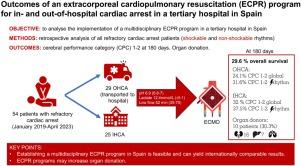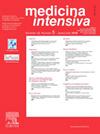Outcomes of an extracorporeal cardiopulmonary resuscitation (ECPR) program for in- and out-of-hospital cardiac arrest in a tertiary hospital in Spain
IF 2.7
4区 医学
Q2 CRITICAL CARE MEDICINE
引用次数: 0
Abstract
Objective
To analyze if the implementation of a multidisciplinary extracorporeal cardiopulmonary resuscitation (ECPR) program in a tertiary hospital in Spain is feasible and could yield survival outcomes similar to international published experiences.
Design
Retrospective observational cohort study.
Setting
One tertiary referral university hospital in Spain.
Patients
All adult patients receiving ECPR between January 2019 and April 2023.
Interventions
Prospective collection of variables and follow-up for up to 180 days.
Main variables of interest
To assess outcomes, survival with good neurological outcome defined as a Cerebral Performance Categories scale 1–2 at 180 days was used. Secondary variables were collected including demographics and comorbidities, cardiac arrest and cannulation characteristics, ROSC, ECMO-related complications, survival to ECMO decannulation, survival at Intensive Care Unit (ICU) discharge, survival at 180 days, neurological outcome, cause of death and eligibility for organ donation.
Results
Fifty-four patients received ECPR, 29 for OHCA and 25 for IHCA. Initial shockable rhythm was identified in 27 (50%) patients. The most common cause for cardiac arrest was acute coronary syndrome [29 (53.7%)] followed by pulmonary embolism [7 (13%)] and accidental hypothermia [5 (9.3%)]. Sixteen (29.6%) patients were alive at 180 days, 15 with good neurological outcome. Ten deceased patients (30.3%) became organ donors after neuroprognostication.
Conclusions
The implementation of a multidisciplinary ECPR program in an experienced Extracorporeal Membrane Oxygenation center in Spain is feasible and can lead to good survival outcomes and valid organ donors.

西班牙一家三级医院针对院内和院外心脏骤停实施的体外心肺复苏(ECPR)计划的成果
目的分析在西班牙的一家三级医院实施多学科体外心肺复苏(ECPR)计划是否可行,以及能否产生与国际上已发表的经验相似的生存结果.设计回顾性观察队列研究.设置西班牙的一家三级转诊大学医院.患者2019年1月至2023年4月期间接受ECPR的所有成年患者.干预措施前瞻性收集变量并随访长达180天.主要关注变量评估结果时,使用了180天时脑功能分类量表1-2的良好神经功能结果定义的存活率。收集的次要变量包括人口统计学和合并症、心脏骤停和插管特征、ROSC、ECMO 相关并发症、ECMO 解除后的存活率、重症监护室(ICU)出院时的存活率、180 天时的存活率、神经系统结果、死亡原因和器官捐献资格。27名患者(50%)确定了最初的可电击心律。心脏骤停最常见的原因是急性冠状动脉综合征[29例(53.7%)],其次是肺栓塞[7例(13%)]和意外低体温[5例(9.3%)]。16名患者(29.6%)在180天后存活,其中15名患者神经功能状况良好。结论在西班牙一家经验丰富的体外膜肺氧合中心实施多学科 ECPR 项目是可行的,并能带来良好的生存结果和有效的器官捐献。
本文章由计算机程序翻译,如有差异,请以英文原文为准。
求助全文
约1分钟内获得全文
求助全文
来源期刊

Medicina Intensiva
CRITICAL CARE MEDICINE-
CiteScore
2.70
自引率
20.00%
发文量
146
审稿时长
33 days
期刊介绍:
Medicina Intensiva is the journal of the Spanish Society of Intensive Care Medicine and Coronary Units (SEMICYUC) and of Pan American and Iberian Federation of Societies of Intensive and Critical Care Medicine. Medicina Intensiva has become the reference publication in Spanish in its field. The journal mainly publishes Original Articles, Reviews, Clinical Notes, Consensus Documents, Images, and other information relevant to the specialty. All works go through a rigorous selection process. The journal accepts submissions of articles in English and in Spanish languages. The journal follows the publication requirements of the International Committee of Medical Journal Editors (ICMJE) and the Committee on Publication Ethics (COPE).
 求助内容:
求助内容: 应助结果提醒方式:
应助结果提醒方式:


